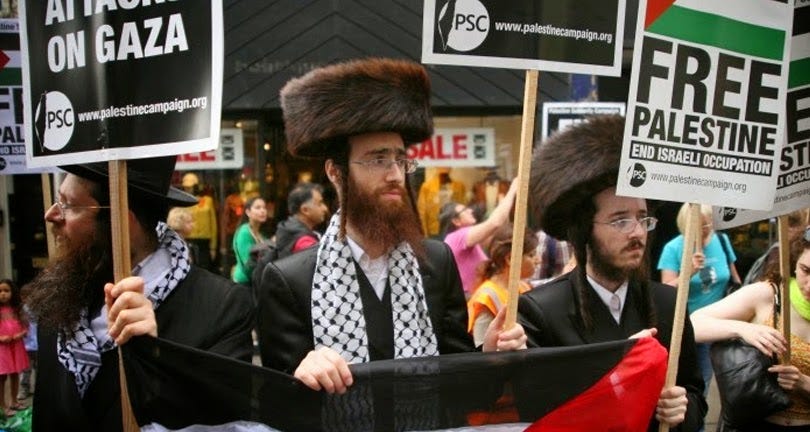Amongst the ruins and misery of Israel and Gaza, exists a common enemy uniting Jews and Palestinians.
Decades of despair and fighting has seen no end, and little is changing.
What is more conclusive is the strength in similarities between Palestinians and Jews – an existence subjugated by the duplicity of callous greed and tyranny.
Anyone suggesting Palestinians and Jews are not alike are captured by an ideology whose intent is generating hatred towards Jews and Palestinians.
Hamas’s attack on Israel was imbued in evil, but so too is Israel’s response - one race isn’t more or less important or worthy of humanity than another.
For Jews and Palestinians - their peace is punctuated by fear and terror and the constant thought of death and reprisal.
Palestinians have been living without hope, purpose, and in the hue of infinite misery.
Emerging from the ruins of Gaza and Israel is Zionistic Politics - the ‘common enemy’ tying ties Jews and Palestinians together.
Conceptualised in the late 1800’s, Zionism has strayed from its foundational ideals.
From Israel’s inception in 1948, tensions heightened within the Palestinian Arab community.
The trauma of Nakba, saw 700,000 plus Palestinians displaced and it laid down a precedent.
The Israeli settlement enterprise, particularly in the West Bank and East Jerusalem is emblematic of the expansionist shift.
Zionism's evolution from a movement for Jewish self-determination to its current political form has stirred debate concerning peace between Jews and Palestinians.
There are strands of Zionism that have deliberately sought to undermine conciliation efforts.
The expansion of Israeli settlements in occupied territories, often driven by Zionist ideology, is a case in point.
These settlements not only displace Palestinians but entrench divisions, making coexistence untenable.
Politically conflating Zionism with Jewish identity has, weaponised anti-Semitism accusations, stifling genuine critics of Israeli policy, further polarising Palestinians and Jews.
The Israeli Government’s strategy is designed to maintain unrest - benefiting political factions within Israel at the expense of lasting peace in the region.
The Israel-Palestine issue is a consequence of decades of political, social, and territorial disputes.
From the Balfour Declaration of 1917 to the creation of Israel in 1948 and many Arab-Israeli wars, the Palestinian people have witnessed significant displacement - many becoming refugees.
Overlooking the suffering of Palestinians denies a substantial chapter of Middle Eastern history.
The Israeli Government’s blockade of Gaza and other restrictive policies have stifled economic growth, unemployment, poverty – with dependency on international aid.
Palestinians feel their history, culture, and identity are under threat, with their narrative marginalised in the broader global debate.
Australia’s politicians have maintained a discreet silence on the issue of Israel-Palestine, with few taking a stand – Greens Leader Adam Bandt and Sydney Lord Mayor Clover Moore being the exception.
Bandt's advocacy is a reminder for Australian politicians, and global leaders, to acknowledge the desperate plight of the Palestinians.
His stance considering allegations Israel is attempting to ethnically cleanse Gaza - contrasts starkly with the reticence of other Australian politicians.
It’s impossible to deny the disproportionate suffering of the Palestinian people.
His address at a pro-Palestinian march told protestors, "Australia cannot remain silent when human rights are trampled upon. The Palestinian people deserve our solidarity and support."
Clover Moore blocked a proposal to light up Sydney Town Hall and fly the Israeli flag in solidarity.
A move that drew criticism from an Israeli Defence Force spokesman saying, “If you want to be on the side of the terrorists or on the side of Israel, its your choice.”
Green lighting the proposals meant taking a side claiming it would be a “divisive” move, Moore said.
She also criticised the state government's decision to light up the Sydney Opera House in Israel's colours.
Zionism isn't a monolithic entity, and Jewish communities worldwide aren’t homogenous.
Many Jewish groups and individuals, both within Israel and globally, have consistently voiced concerns over the direction Zionistic politics has taken.
Organisations like 'B'Tselem' and 'Jewish Voice for Peace', have been critical of Israeli policies, emphasising human rights and advocating for a just solution.
Their existence underscores the fallacy of equating all Jewish individuals with the actions or policies of the State of Israel.
The crisis in Gaza is a reminder of the longstanding Israel-Palestine conflict and the need to address the Palestinian plight.
History has shown, any attempt at peace failing to acknowledge the historical and present-day suffering of Palestinians is doomed.




